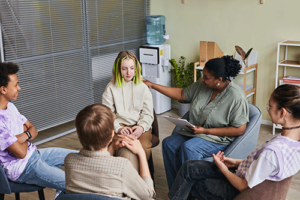Exploring the meaningful effects of teenager therapy on mental health
Wiki Article
How Teen Treatment Can Encourage Young Minds and Advertise Development
Young adult therapy plays a critical duty in forming the mental well-being of teens. It attends to the distinct challenges they face, cultivating psychological understanding and durability. By checking out various therapeutic methods, young people can develop essential coping strategies. This process not only aids in personal growth but additionally boosts their capability to navigate relationships. Understanding the characteristics of this healing trip reveals deeper understandings into how it can fundamentally modify their path towards adulthood.Recognizing the Relevance of Mental Health And Wellness in Teenagers
Why is mental health and wellness essential for young adults throughout their developmental years? This period is marked by quick physical, emotional, and cognitive adjustments. Teenagers commonly navigate facility social dynamics, academic pressures, and the pursuit for identification, making psychological wellness a crucial component of their total wellness. Healthy and balanced psychological states allow teenagers to develop resilience, grow self-worth, and manage tension efficiently. Resolving psychological health and wellness concerns early can avoid long-term mental difficulties, enabling teenagers to prosper academically and socially.Understanding mental health and wellness in teens includes identifying the unique difficulties they deal with. Awareness and support can foster open communication, enabling young individuals to express their feelings and seek assistance when required. By focusing on psychological health, society can encourage young adults to build coping techniques, develop healthy relationships, and accomplish their full capacity. Eventually, supporting psychological health throughout these formative years lays the structure for a well balanced, meeting the adult years.
Usual Difficulties Faced by Teens
Teenagers usually encounter various challenges that can dramatically influence their mental health and wellness. Emotional policy struggles, peer pressure characteristics, and scholastic stress management prevail issues that form their experiences. Attending to these challenges is crucial for promoting strength and empowerment in teens.Emotional Regulation Has A Hard Time
Several young adults experience significant psychological regulation struggles as they browse the complexities of adolescence. This developing stage is marked by rising and fall feelings, commonly leading to problem managing feelings such as rage, stress and anxiety, and unhappiness. Young people may locate themselves overwhelmed by their psychological responses, causing impulsive habits or withdrawal. Aspects such as hormonal changes, social pressures, and scholastic difficulties aggravate these struggles. Several teens lack the coping methods necessary to reveal their feelings appropriately, which can cause conflicts in connections and hinder individual development. Additionally, sensations of seclusion might arise, as they usually believe their experiences are distinct. Identifying and resolving these psychological regulation issues via therapy can empower teens to develop much healthier coping devices and foster strength.
Peer Stress Characteristics
Navigating the psychological disturbance of adolescence usually brings teens face-to-face with peer pressure dynamics. This effective impact can substantially shape their choices, behaviors, and self-image. Teenagers might feel forced to adapt their peers' expectations, causing high-risk behaviors, such as compound use or undesirable connections. The wish for acceptance and concern of rejection increase these stress, often leading to interior conflict. Young adults may have a hard time to insist their individuality, fearing backlash from their colleagues. Treatment can give a risk-free area for young individuals to check out these characteristics, enabling them to develop techniques for withstanding negative impacts (therapist for teens near me). With empowerment and self-awareness, teenagers can learn to navigate peer pressure better, fostering resilience and promoting much healthier decision-making
Academic Stress And Anxiety Administration
How do academic stress influence the health of teens? For several teens, the quest of high qualities and college readiness typically brings about frustrating stress and anxiety. This stress and anxiety manifests in numerous ways, consisting of anxiety, depression, and physical wellness problems. The fear of failing and the ruthless competitors can create a toxic environment that prevents psychological and social development. Furthermore, impractical assumptions from parents and instructors can worsen feelings of inadequacy. Teens might have a hard time to balance academics with extracurricular tasks, further escalating their tension degrees. Efficient scholastic tension management techniques, such as time monitoring, relaxation methods, and looking for assistance, come to be necessary. By dealing with these challenges, therapy can equip teenagers to establish healthier coping mechanisms, cultivating durability and promoting general health.The Role of Therapy in Teenage Growth
As adolescents shift via the intricacies of teenage years, therapy becomes a critical support group, fostering emotional durability and individual development. During this developmental duration, teenagers grapple with identity, peer pressure, and emotional turmoil. Treatment gives a risk-free area for them to discover their sensations, thoughts, and behaviors without judgment. This exploration enhances their self-awareness, allowing them to recognize their responses and feelings more deeply.Therapy helps adolescents create dealing strategies to manage stress and anxiety, essential abilities that will certainly benefit them throughout life (therapist for teens near me). By taking part in therapeutic discussions, teenagers find out to articulate their needs and develop much healthier partnerships. This procedure not only advertises specific growth but likewise adds to better communication and conflict resolution abilities. Eventually, therapy offers as an important device in guiding teens towards positive growth, equipping them to navigate the obstacles of teenage years with confidence and durability
Techniques Made Use Of in Teenager Treatment
In teen therapy, various strategies are employed to cultivate empowerment and individual growth. Cognitive Behavior Techniques focus on improving unfavorable idea patterns, while Meaningful Arts Therapies motivate self-discovery through innovative expression. Together, these methods offer teens with important devices to navigate their psychological and psychological difficulties.Cognitive Behavioral Strategies
Cognitive Behavioral Methods (CBT) play an important duty in teenager treatment, particularly as they address the special obstacles dealt with during teenage years. These strategies focus on determining and changing adverse idea patterns that add to psychological distress and behavioral problems. By encouraging teens to identify irrational beliefs and change them with useful ideas, CBT fosters resilience and coping strategies. Therapists usually use tools such as thought documents, behavior experiments, and exposure jobs to help adolescents face their fears and develop healthier actions. CBT stresses goal-setting, which encourages young adults to take ownership of their development. This organized strategy not just minimizes signs and symptoms of anxiety and clinical depression yet additionally outfits young people with skills to browse life's difficulties extra successfully.Expressive Arts Therapies
While conventional talk therapies might not reverberate with every teenager, Meaningful Arts Therapies offer an alternative technique that utilizes imagination as a way of self-expression and recovery. This method includes various art forms, including paint, dramatization, dancing, and music, enabling teens to connect emotions and experiences that may be hard to verbalize verbally. Participating in these creative procedures can cultivate self-discovery, boost confidence, and assist in psychological handling. Moreover, the non-judgmental setting of meaningful arts enables teenagers to explore their identifications and handle difficulties in a helpful setting. By incorporating meaningful arts into treatment, experts can provide an all natural technique that not only addresses psychological struggles yet likewise equips young minds to grow and grow.Building Strength Through Restorative Practices
As adolescents navigate the complexities of their developing years, building strength through therapeutic methods ends up being important for their psychological well-being. Efficient healing strategies, such as cognitive-behavioral therapy and mindfulness strategies, empower teens to challenge challenges and establish dealing strategies. By learning to determine and handle their feelings, young individuals can grow a better sense of self-efficacy.
Participating in treatment enables adolescents to explore their ideas and sensations in a risk-free setting, advertising adaptability when faced with difficulty. This process motivates them to watch setbacks as chances for development as opposed to counselling for teens insurmountable challenges. Group therapy settings further improve strength by promoting social links and offering peer support, reinforcing the idea that they are not alone in their struggles.
Eventually, healing methods function as important tools, furnishing teens with the abilities needed to browse life's difficulties and arise more powerful and much more resistant in their trip towards the adult years.
The Long-Term Benefits of Engaging in Therapy
Taking part in treatment throughout teenage years can produce substantial long-lasting benefits that expand well into adulthood. By attending to psychological and emotional difficulties early, young adults can create much healthier coping systems that linger throughout their lives. Therapy promotes self-awareness, equipping young individuals to understand their thoughts and feelings much better, which can result in improved decision-making abilities.Consistent therapeutic engagement can enhance interpersonal relationships. Teenagers often discover reliable communication and conflict-resolution approaches, which can enhance connections with peers, family, and future coworkers. This structure of emotional knowledge typically causes boosted resilience versus tension and adversity.
Furthermore, individuals that get involved in treatment during their formative years might experience minimized risks of psychological wellness problems later on in life. Ultimately, early restorative treatment equips teenagers with essential tools for navigating life's intricacies, advertising both personal growth and total well-being as they shift into the adult years.
Regularly Asked Concerns

Just How Can Moms And Dads Assistance Their Teens Throughout Treatment Sessions?
Parents can sustain their teens throughout treatment sessions by proactively listening, respecting their personal privacy, urging open communication, and verifying their sensations. They ought to additionally continue to be client and understanding as their teenagers browse the therapeutic process.What Should a Young adult Anticipate in Their Very First Therapy Consultation?
In their first treatment appointment, a teenager can anticipate an introductory conversation, discussing their issues and feelings. The therapist will certainly produce a risk-free setting, develop objectives, and clarify discretion to foster count on and visibility.Exist Age Limits for Teenagers Looking For Treatment?
There are usually no stringent age limitations for teenagers looking for therapy; however, solutions might differ by provider - counselling for teens. The majority of therapists take into consideration clients aged 13 to 19, while younger youngsters could call for adult participation or different sourcesHow Can Teenagers Find a Specialist They Get in touch with?
Teenagers can locate a specialist by looking for referrals from relied on grownups, investigating online directories, or utilizing college sources. Building connection with first appointments assists make sure a comfortable connection, vital for reliable treatment and individual growth.Is Online Treatment Reliable for Young Adults?

Online treatment can be reliable for young adults, giving adaptability and access. Several young people value the convenience of digital sessions, which can boost visibility and assist in interaction, eventually adding to their psychological health and individual development.
Teen therapy plays a critical role in forming the psychological wellness of teens. In teen treatment, different strategies are utilized to foster empowerment and individual development. Cognitive Behavioral Methods (CBT) play a crucial duty in young adult treatment, especially as they address the special difficulties encountered during teenage years. While conventional talk therapies might not reverberate with every teen, Expressive Arts Treatments use an alternative method that uses creativity as a way of self-expression and recovery. Effective restorative techniques, such as cognitive-behavioral treatment and mindfulness methods, encourage young adults to challenge difficulties and establish dealing approaches.
Report this wiki page